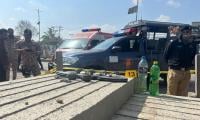CCTV images of a bound and gagged journalist barely managing to limp out of his apartment for help should shake a democratic society into action – or outrage. At the very least, it should be shocking. Unfortunately, that Pakistan is a dangerous country for journalists has been proven time and again. And each time the levels of impunity rise, and what should ideally be the consequential protest turns more into numb acceptance. The facts are thus: Pakistan sits at an unenviable 145th position on the RSF’s Press Freedom Index; there has been a disturbing increase in openly violent attacks on journalists seen as ‘critical’ of set narratives; and there has been near-zero reckoning when it comes to attacks on the media in the country, despite brand-new legislation for the ‘protection’ of the country’s journalists. The lack of any consequences has also translated into routine attacks on journalists covering anything that questions governments, federal and provincial – as seen in the roughing up of journalists covering Sindh’s Covid lockdown.
The most recent violent attack took place on Tuesday night, when journalist and activist Asad Ali Toor opened the door of his Islamabad apartment to find three ‘unknown’ men who proceeded to beat him up. The men left him bound and gagged and injured. Police say they are investigating, while the government has said it condemns any such acts and will also ensure investigation. Not long ago another senior journalist and former head of Pemra, Absar Alam, also became a victim of a life-threatening attack in Islamabad. Before that journalist Matiullah Jan was ‘picked up’ in broad daylight in the capital of Pakistan, to be released some time later. And these are just some of the more well-known and recent instances. These three cases took place in Islamabad, a city that is supposed to have the Safe City camera initiative working to ensure that such crime is not left unresolved. And yet somehow, mysteriously, journalists and activists seem to get beaten up or abducted or shot at, and investigations just fizzle out after the initial conversation goes quiet.
Such brazen attacks cannot and should not be brushed aside as an insignificant or one-off incident. The pattern is clear; the impunity is clear; the silence is deafening. Journalists’ unions are demanding real answers and real investigation into these attacks. That is welcome solidarity, which should ideally continue till Pakistan’s journalists can openly, and without fear of the gag of the censor or of physical violence, do their job: reporting the news; holding power accountable. We must also remember what can happen when silence in the face of such open intimidation continues. If journalism is democracy’s watchdog and the journalist ‘the watchful eye of the people’, we must ask those who watch from the sidelines and find refuge in silence, or become willing puppets in the hands of persecutors: who is the Pakistani press supposed to serve – and how, if it continues to be beaten into silence?
Representational image. —APP/FileIf you live in Karachi, or anywhere else in Pakistan for that matter, you have...
Screengrab shows X services down in Pakistan. — Geo.tvIt has been two months since social media platform X has been...
Health experts estimate an 8.0 per cent and 5.0 per cent increase in hepatitis B and C related deaths, respectively,...
PTI has managed to carve out a tough-to-defeat position in Pakistan’s politics and polity both
Rain on Sunday alone led to the deaths of 12 people – two in Balochistan, six in Khyber Pakhtunkhwa and four in Punjab
India seems to be following Israel model of carrying out assassinations on foreign soil of people it sees as a threat...







